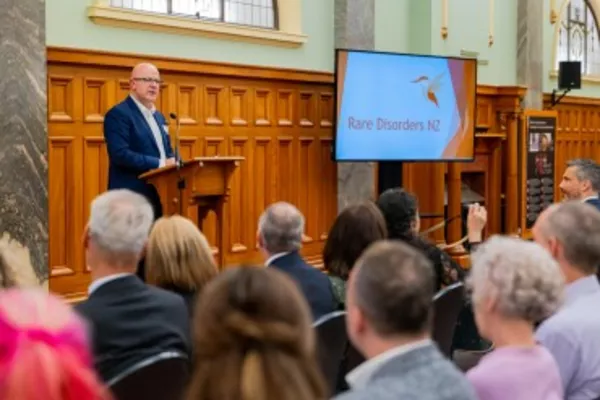White paper launch receives interest across political spectrum
1 Mar 2024
On the eve of Rare Disease Day, a wide range of rare disorders stakeholders gathered together for the launch of the latest Impact of Living with a Rare Disorder in Aotearoa New Zealand and Impact for Whānau Māori of Living with a Rare Disorder white papers at parliament. These papers were based on Rare Disorders NZ’s 2023 Voice of Rare Disorders Survey – the largest-ever survey of consumer-reported outcomes for rare disorders in this country.
Over 130 people attended the event, including representatives from patient support groups, research institutions, government Ministries, pharmaceutical industry, advocacy organisations, as well as MPs from across the political spectrum. It was particularly encouraging to have not only the Minister of Mental Health (who hosted the event) in attendance, but to also have the Minister of Pharmac and the Minister of Health present.
The white paper, written by HealthiNZ and funded by Medicines NZ, is the third to be released, following papers in 2020 and 2022. Sadly, but unsurprisingly, the results remain largely unchanged from previous papers, reflecting that very little progress has been made over the years to improve the health and wellbeing of people living with a rare disorder in Aotearoa New Zealand.
Among the findings, the white paper reports that the majority of people living with a rare disorder continue to be limited by their rare disorder, with a number of everyday activities difficult to manage. Approximately half of people are self-funding costs of their healthcare (e.g. healthcare professionals, treatments and medications and special diets) to some extent with the majority finding this hard to manage, or unable to afford it. Full employment is a challenge for people and their carers, often requiring modified work arrangements or the need to leave their jobs. Their rare disorder has serious effects, not only on their own mental health and wellbeing, but also on their family/whānau, with one in three often unhappy and depressed and feeling they cannot overcome their problems.
The paper highlights that while progress has been made on the development of New Zealand’s first Rare Disorders Strategy, implementable actions are needed to truly make a difference.
Rare Disorders NZ invited Prof Gareth Baynam, clinical geneticist and Medical Director of the Rare Care Centre in Perth to be the guest speaker at the parliament launch. Prof. Baynam encouraged those in attendance to be outraged by the results in white paper but then to seek out the opportunities among the results and recognise the potential – of how things could be better.
In addition to the white paper reporting on total responses, a companion report based on the responses from Māori was also commissioned and launched simultaneously, due to the increased proportion of survey respondents identifying as Māori (13.3%). The survey findings suggest Māori with a rare disorder were generally able to access healthcare services at least at a similar rate to non-Māori. However, given the limited number of Māori participants and their differing demographics from non-Māori, it's important to recognise potential limitations in conclusively determining whether Māori and non-Māori with rare disorders experience similar healthcare access in Aotearoa. Rare Disorders NZ intends to do further analysis in this area.


